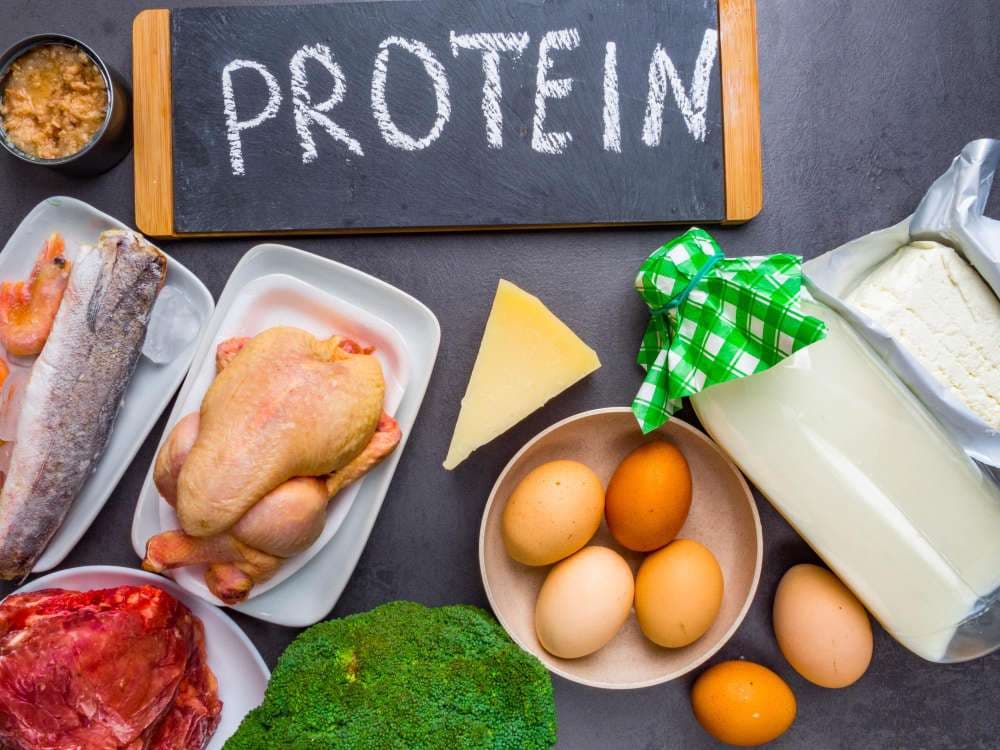What Do Proteins Do: The Unsung Heroes of Life

MyFitnessCoach
September 28, 2023
Proteins: They are the unsung heroes of life, silently performing countless essential tasks inside our bodies and all living organisms. While you may have heard of proteins in the context of a high-protein diet for muscle building, their roles extend far beyond just that. This article will discuss the fascinating world of proteins, exploring what they are, what they do, and why they are crucial for life itself. So let’s dive in:
Functions of Proteins
Now that we have a basic understanding of what proteins are made of, let's explore the functions of proteins in your body.
Enzymes: The Catalysts of Life
Proteins often act as enzymes, which are biological catalysts that speed up chemical reactions. Without enzymes, many essential reactions in your body, like digesting food, would be too slow to sustain life.
Structural Proteins: The Builders
Structural proteins provide support and shape to cells and tissues. Collagen, for example, is a structural protein that gives your skin, bones, and tendons their strength and elasticity.
Transport Proteins: The Shuttlers
Some proteins transport substances like oxygen (hemoglobin in red blood cells), nutrients, and waste products within your body. Without these transport proteins, the movement of vital molecules would be inefficient or impossible.
Antibodies: The Defenders
Antibodies are specialized proteins that play a crucial role in your immune system. They recognize and neutralize harmful bacteria and viruses, helping your body achieve physical wellness.
Hormones: The Messengers
Hormones are signaling molecules that regulate various processes in the body, such as growth, metabolism, and reproduction. Proteins like insulin and adrenaline act as hormones to control these functions.
Muscle Proteins: The Movers
Muscles are composed of proteins, specifically actin, and myosin, which work together to enable muscle contraction. This contraction allows you to move your body, from gym workouts, running, and walking to simply breathing.
Storage Proteins: The Reserves
Some proteins serve as storage containers for important molecules like iron (ferritin) or amino acids (ferritin). These reservoirs ensure that essential resources are readily available when needed.
Gene Expression: The Regulators
Proteins are crucial in regulating gene expression. Transcription factors are proteins that control when and how genes are turned on or off, impacting the development and function of an organism.
Cell Signaling: The Communicators
Signaling proteins transmit messages between cells, coordinating various processes like growth, development, and immune responses. They ensure that cells in your body work together harmoniously.
Proteins in Everyday Life
Beyond their crucial roles within our bodies, proteins also impact our daily lives in various ways:
- Nutrition: The food we eat contains proteins, which our bodies break down into amino acids for various functions. Eating a balanced diet with sufficient protein is essential for physical fitness.
- Biotechnology: Scientists use proteins in biotechnological applications, such as genetic engineering and the production of medicines like insulin through recombinant DNA technology.
- Food Industry: Proteins are used in food processing to enhance texture, flavor, and nutritional value. Examples include adding protein to energy bars or using enzymes in cheese production.
- Environmental Cleanup: Enzymes produced by microorganisms (also proteins) are used in environmental cleanup efforts to break down pollutants.
- Forensics: Proteins can be used in forensic science to identify individuals through DNA analysis.
The Language of Proteins: The Genetic Code
To understand the vast diversity of proteins and their functions, we need to explore the genetic code. In essence, our DNA, the genetic material, encodes the instructions for building proteins. It's like having a huge recipe book where each recipe corresponds to a different protein.
The genetic code consists of sequences of nucleotide bases (adenine, thymine, cytosine, and guanine) that form genes. These genes are then transcribed into messenger RNA (mRNA), which serves as a template for protein synthesis. The mRNA carries the genetic code to ribosomes, where proteins are assembled based on the instructions it provides.
Each set of three nucleotides in the mRNA is called a codon, and each codon specifies a particular amino acid. Consider codons as words in a sentence, each representing an amino acid. As the ribosome reads the mRNA, it selects the corresponding amino acids and strings them together to build the protein.
It's this genetic code that allows organisms to produce an astounding diversity of proteins, each with its unique function and purpose.
Proteins in Disease
Proteins are vital for health, but they can also play a role in diseases. Sometimes, proteins don't function correctly due to genetic mutations or environmental factors. Here are a few examples:
- Genetic Disorders: Some genetic mutations result in defective proteins, leading to conditions like cystic fibrosis or sickle cell anemia.
- Cancer: Mutations can cause proteins that regulate cell growth to malfunction, leading to uncontrolled cell division and the development of tumors.
- Neurodegenerative Diseases: Diseases like Alzheimer's and Parkinson's are linked to the misfolding of specific proteins, leading to the accumulation of abnormal protein aggregates in the brain.
Understanding these disease-related protein problems is crucial for developing treatments and therapies to restore proper protein function and alleviate symptoms.
In summary, proteins are the invisible builders of life, arranging the countless processes that keep living organisms functioning. These versatile molecules play many roles, from enzymes that speed up reactions to structural proteins that provide support and hormones that regulate growth.
Understanding proteins is not just a matter of scientific curiosity; it's crucial for improving human health, solving diseases, and advancing technology. The next time you enjoy a meal, remember that the proteins in your food are building blocks for your body's functions.
If you find this piece of writing interesting and informative, we have much more for you. Download MyFitnessCoach app right now and explore the science of fitness
Frequently Asked Questions
Similar Articles
Stay informed with these similar articles.

MyFitnessCoach
October 18, 2023
What Does Body Goals Mean? A Path to a Healthy Lifestyle
In the world we live in now, lots of people talk about "body goals," which means having a body that's seen as perfect. On social media, in magazines, and on TV, we see lots of pictures of people with what seems like perfect bodies, which makes us feel like we have to look like them. But the real meaning of "body goals" is more than just looking good. It's about taking care of your whole self, not just how you look. In this article, we will discuss what does body goals actually mean and how you can achieve your body goals. Let’s get started:
.webp&w=3840&q=75)
MyFitnessCoach
September 5, 2023
How Much Protein in an Egg | The Nutritional Power
Eggs have long been a breakfast favorite for many, and for good reason. They're not only delicious but also packed with essential nutrients, making them a versatile and nutritious addition to your diet. One of the most common questions about eggs is, "How much protein is in an egg?" In this comprehensive guide, we'll delve into the world of eggs and explore their protein content, nutritional benefits, and how they can contribute to a balanced diet.

MyFitnessCoach
May 18, 2023
Fitness Guide: How Do I Start A Weight Loss Journey
Ready to start on a life-changing weight-loss journey? Congratulations for taking the first step towards being a better and happier version of yourself! Starting off a weight-loss journey may be both satisfying and stressful. With so much information available, having a well-defined plan and trusted assistance in achieving your goals is important. This article will help you start your weight-loss journey and achieve the results you desire.
